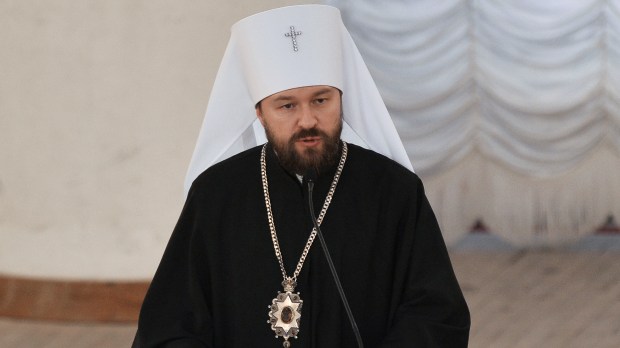Participating in a London conference on the topic of “The Christian Future of Europe,” Metropolitan Hilarion Alfeyev, head of the External Relations Departments of the Russian Orthodox Church, Moscow Patriarchate, spoke on September 22 at the Russian Embassy to Great Britain, and his talk was something of a warning to the Churches of the West.
Opening his talk with an acknowledgement of Christian persecution throughout the world, and armed with research figures hewn from recent PEW polls and other studies, Hilarion painted a grim but up-to-date and accurate picture of what Christianity is currently facing due to migration and Western secularization, and also what the future of Christianity will look like without a deep and strenuous effort at evangelization.
The Archbishop presented a sobering look at how migration is impacting Europe: “According to figures by the European Union agency Frontex, more than 1.8 million migrants entered the EU in 2015 alone … the number of migrants in Europe has increased from 49.3 million people in 2000 to 76.1 million people in 2015.”
“The other reason for the transformation of the religious map of Europe,” said Hilarion, “is the secularization of European society. Figures in a British opinion poll indicate that more than half of the country’s inhabitants – for the first time in history – do not affiliate themselves to any particular religion.”
This trend is not holding true in Russia, where an identification with faith is on the upswing, although “many defined themselves as ‘religious to some degree’ or ‘not too religious’ … However, the number of people who define themselves as being ‘very religious’ is growing steadily.”
That good news must be balanced an understanding of the rapid decline of religious practice in Europe and North America, and here Hilarion suggested that history must be given its due study, as a warning:
I would like to remind you all that in Russia before 1917 nobody ever proposed that the collapse of a centuries-old Christian empire would happen and that it would be replaced by an atheistic totalitarian regime. And even when that did happen, few believed that it was serious and for long. The modern-day decline of Christianity in the western world may be compared to the situation in the Russian Empire before 1917. The revolution and the dramatic events which followed it have deep spiritual, as well as social and political, reasons. Over many years the aristocracy and intelligentsia had abandoned the faith, and were then followed by common people. His Holiness Patriarch Kirill of Moscow and All Russia spoke of this in January 2017: “The fundamental rupture in the traditional way of life – and I am now speaking … of the spiritual and cultural self-consciousness of the people – was possible only for the reason that something very important had disappeared from peoples’ lives, in the first instance those people who belonged to the elite. In spite of an outward prosperity and appearance, the scientific and cultural achievements, less and less place was left in peoples’ lives for a living and sincere belief in God, an understanding of the exceptional importance of values belonging to a spiritual and moral tradition.”
Hilarion seemed to reserve a special condemnation of the resistance to religion demonstrated by the European Union:
And when half a century after the creation of the European Union its constitution was being written, it would have been natural for the Christian Churches to expect that the role of Christianity as one of the European values to have been included in this document, without encroaching upon the secular nature of the authorities in a unified Europe. But, as we know, this did not happen. The European Union, when writing its constitution, declined to mention its Christian heritage even in the preamble of the document. I firmly believe that a Europe which has renounced Christ will not be able to preserve its cultural and spiritual identity.
The Archbishop’s full speech may be read here.

